Myronivsky Hliboproduct (MHP), Ukraine
The leading Ukrainian agribusiness giant has been enjoying generous support in public funds and national subsidies. With over half a billion euros from the EBRD, EIB and the IFC, Myronivsky Hliboproduct PJSC (MHP) has grown into a near monopolist in poultry production. While MHP’s vertically integrated model has contributed to its status as a leading Ukrainian agribusiness, the scale and nature of its business have also contributed to mounting concerns about its social and environmental impacts. These concerns are compounded by patterns of poor community consultation and a lack of information provided about MHP’s operations, leaving project-affected people guessing about the true impacts of its operations.
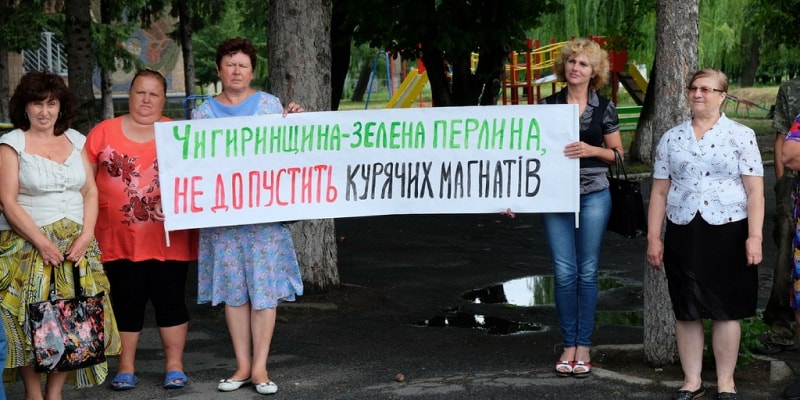 'Chyhyryn area is a green pearl, do not let chicken magnates in'
'Chyhyryn area is a green pearl, do not let chicken magnates in'
Stay informed
We closely follow international public finance and bring critical updates from the ground.
Background
Ukraine’s leading poultry producer, MHP, has received four loans from the European Bank for Reconstruction and Development (EBRD). The investments from public banks including the EBRD, the European Investment Bank, the International Finance Corporation and export credit agencies like Atradius now amount to more than half a billion euros.
In 2017 alone, the company received generous state subsidies totaling 30 % (1.4 bl UAH) of all subsidies to the agribusiness sector. The Company’s vertically integrated business model involves controlling all aspects of the poultry production chain: growing crops to produce chicken fodder; collecting, incubating and hatching eggs; raising and slaughtering chickens; processing, distributing and selling their meat; and re-purposing manure as fertilizer for its crops. By 2017, MHP had expanded its production of chicken meat to over 560,000 tonnes per year. The Company controls around 370,000 hectares of crop land, one of the largest land banks in Ukraine.
The company also benefits from a quota for poultry exports to the EU as part of the Ukraine-EU Association Agreement, opened meat processing plants in the Netherlands in 2016 and Slovakia in 2017 and has plans to conquer more EU countries. Meanwhile, MHP is also currently actively expanding its Vinnytsia Poultry Complex (Phase 2 and biogas plant) and its Peremoha Nova parent poultry farm in the Cherkasy region to support its exports strategy.
The massive investments by public financial sources have not, however, brought the company’s performance and culture in line with the relevant EU and EBRD standards. While a new, more robust law governing EIAs in Ukraine came in effect as of late December 2017 is still in a “testing regime”, only applies to new constructions, it will play no role in filling existing and past gaps in MHP’s impact assessment disclosure and public consultations.
MHP is one example how a company uses the opportunities provided by weak safeguards and low standards at national level, special taxation for agricultural enterprises, the international buzz around the country’s agricultural sector and the favourable financing that comes with it. While gaps in obligations and continuing promises to communities (for instance by-pass road, forestry belt, improvement of infiltration fields, solutions for odors and manure storing) persist, the Company’s construction of its poultry complexes has continued on time. We interpret this as a prioritization of MHP’s profit-making operations over the interests and wellbeing of local communities.
In June 2018, locals filed an official complaint with the EBRD and the IFC. The complaint alleges that since the start of MHP operations in Vinnytsia in 2010, continuous odor and dust from a significant and growing number of facilities and the application of manure on nearby fields has made local life untenable. MHP activities have also led to a drastic increase in heavy vehicle traffic through villages, resulting in damage to roads and nearby residences, and risks from pollution to air, water and soil have not been studied properly, the complaint says. As of February 2020, the case is still pending.
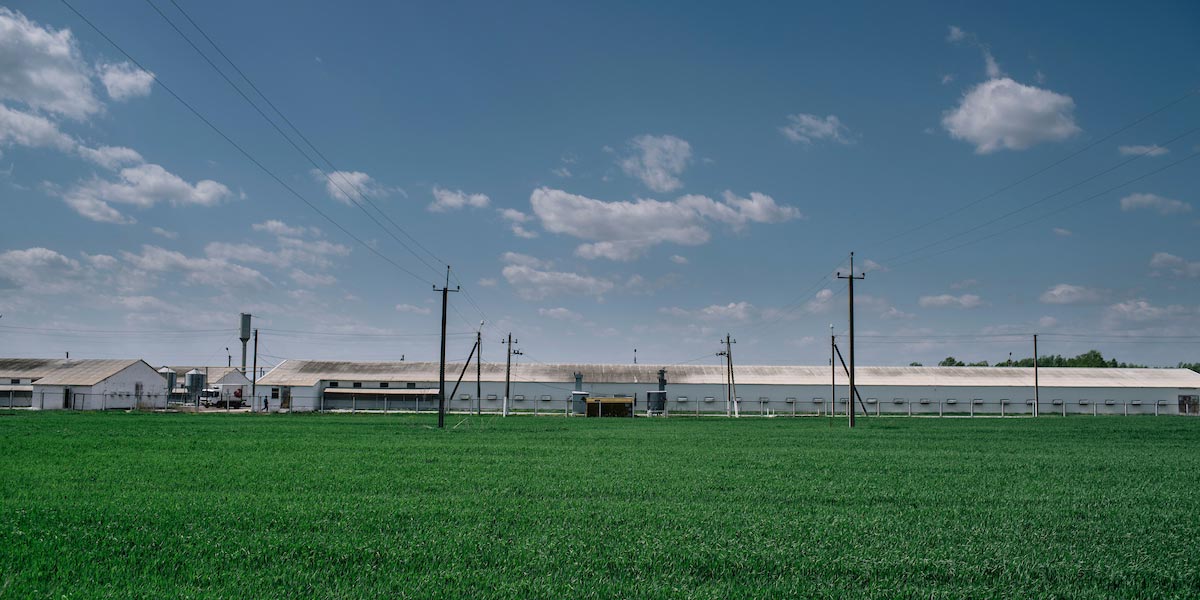

MHP founder, CEO and majority shareholder Yuriy Kosyuk controls MHP through 100 % ownership of WTI Trading Limited, which holds more than 60% of MHP shares.
Kosyuk appears well connected to the Ukrainian government, as suggested by his brief appointment to the post of the First Deputy Head of the Presidential Administration in 2014.
Key issues
Human rights abuses
Over the past few years, activists who have publicly raised fears and concerns about MHP operations have been subject to various forms of pressure, intimidation and violent attack. In some instances, testimonials seem to indicate potentially coordinated and pre-planned attacks. More >>
Stakeholder engagement
In 2017, MHP released a new Stakeholder Engagement Plan (SEP) that lays out its processes for consulting and communicating with local people and other stakeholders. The new SEP is oftentimes framed in such general terms that it is difficult to know exactly what MHP is committing to, or to hold the Company accountable to those commitments. Further, since the plan was released in 2017, there have not been noticed much change in the major consultation and communication challenges with the communities, leaving fears that the new SEP will not have much impact on MHP’s practice. More>>
Poor compliance
In spite of massive backing by public financial sources, MHP does not implement relevant international standards with regards to information disclosure, impact assessment, stakeholder engagement and consultations. The EBRD has said it is satisfied that the company’s operations are in compliance with national law. More >>
Lost opportunities
Intensive, export-oriented food production would decrease the potential for local, traditional agriculture and tourism, while the economic benefits for the local economy are questionable. More>>
CHICKEN FARMS MANURE STORAGES MEAT PROCESSING WASTE WATER TREATMENT HATCHERY FODDER BIOGAS
Human rights abuses
Practically from the beginning of its operations in all regions MHP has not made enough effort to inform the communities about its plans. Over time, the earlier promises have not materialised (e.g. bypass roads), the negative impacts persist and no explanations or monitoring data is provided. So, when the expansion plans became clear, communities started expressing actively their disagreement [1, 2].
When community members began organizing against the operations, that’s when the smear campaigns, beatings and other pressure began.
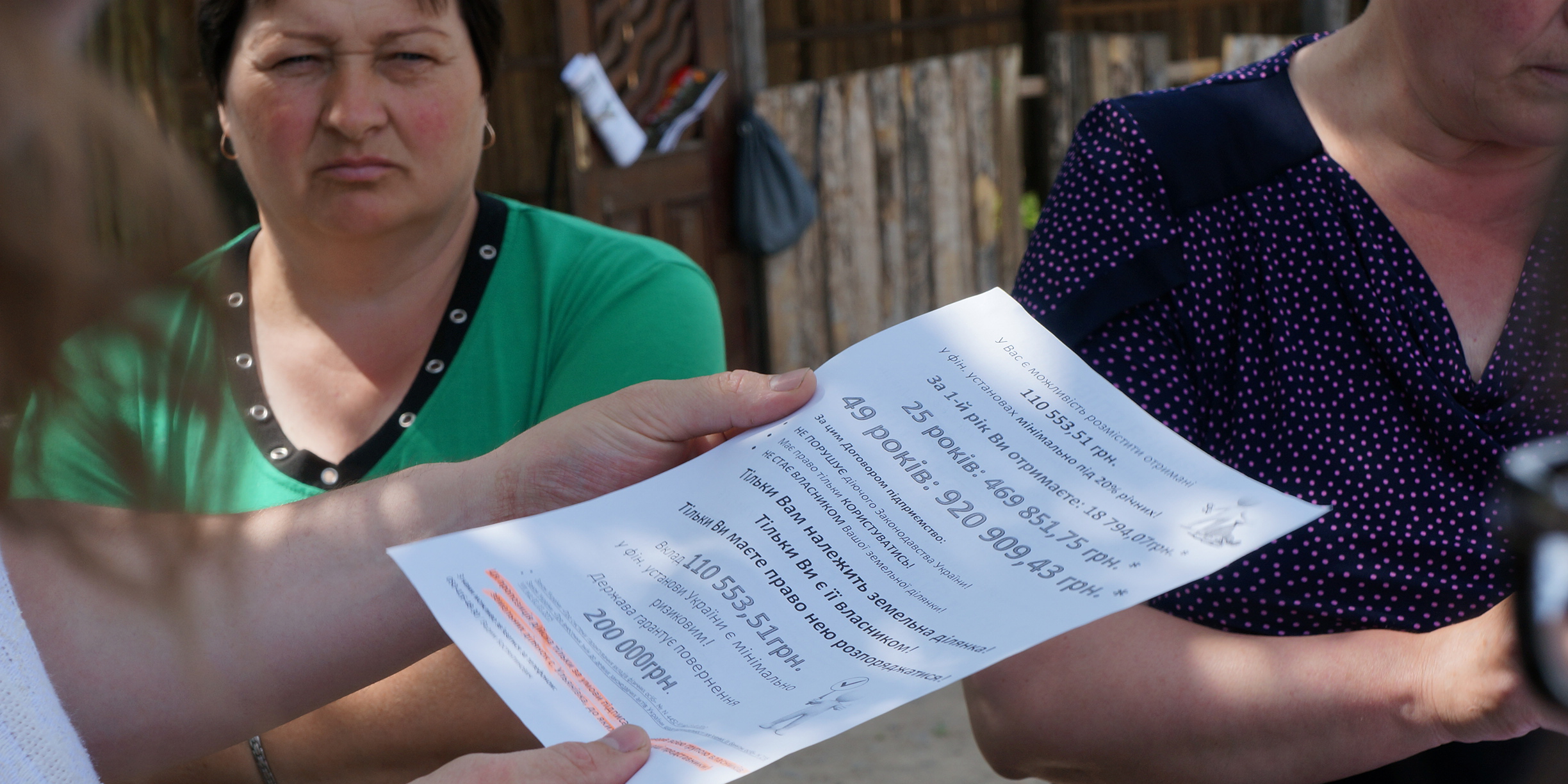
Beatings of activists
While numerous allegations by activists against intimidation, harassment and retaliation threats accompany the MHP’s expansion, the only known and clear common thread among the attacks and pressure is that each of the victims were prominent leaders in movements critical of the Ukrainian agribusiness company MHP.
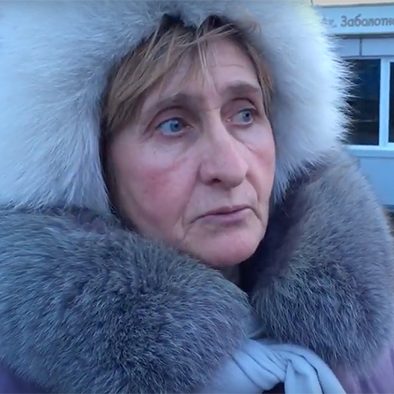
Nina Martynovska,
community activist
June 2016: brutally beaten for her opposition to the poultry farm, a subsidiary of the MHP – as confirmed by the court.
Volodymyr Sukhopara, local farmer: beaten by unknown men, 2015
Andrii Skakodub, investigative journalist: beaten by unknown men, 2015
Vasyl Tkachenko, head of local council: beaten by two boxers, 2015
Leading activist: framed for drug trafficking, 2016
Olexander Chaykovsky, local activist: framed for drug dealing and possession, 2017
© Niels Ackermann / Lundi13
Stakeholder engagement
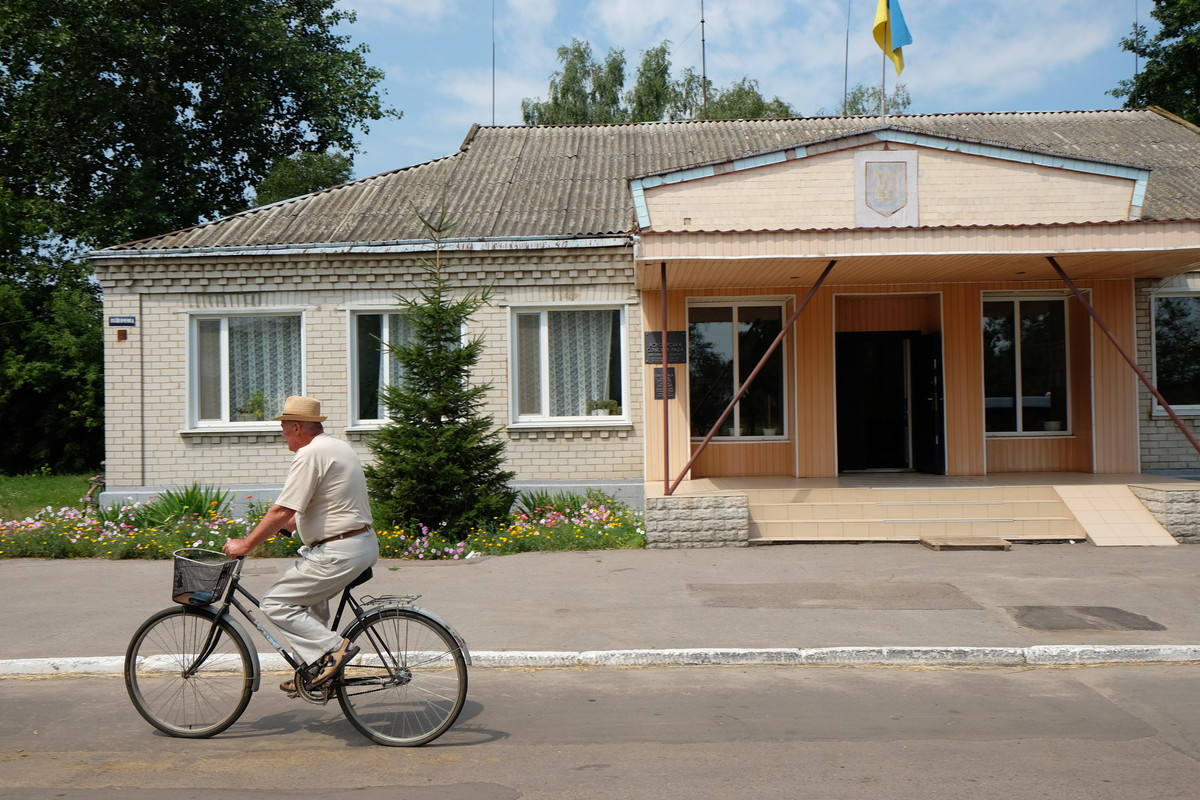
In February 2016 the EBRD disclosed a Monitoring Assessment Report on MHP, which recommended that the company should improve its stakeholder engagement and develop a formal Land Acquisition Framework.
Two years later improvements are few and far between, although the company meanwhile hired consultants to train its staff and assist with an upgrade to the company’s Stakeholder Engagement Plan.
In the absence of a Land Acquisition Framework, MHP’s expansion plans are implemented within the framework of its outdated and substandard practices of impact assessment and public consultations.
Major issues
1. Transparency:
MHP`s disclosure practices have been deficient in a number of ways. MHP has failed to provide easy access to impact assessment documents and the ones that have been disclosed did not provide adequate information on the risks and potential negative impacts.
Stakeholders have had great difficulty accessing basic information of the company’s planned or current activities, including environmental assessments, in violation of best international and financial institutions’ standards (EBRD, IFC).
For instance, MHP should have conducted and disclosed one comprehensive ESIA covering all operations for Phase 2 of the Vinnytsia complex. Instead, even the piecemeal environmental assessments that the company has carried out on individual facilities are not easily available to local affected people.
2. Public Consultations:
At present consultations on MHP operations are organised with a number of faults. For example, public meetings are not properly announced, sometimes excluding interested stakeholders (e.g. neighbouring villages or even villages from the same communities) and the materials prepared for hearings and consultations are not easily accessible by the public. Physical fights at the entrance of public hearing halls, as well as interventions by police and company security, are not an uncommon sight.
Consultations focus on the benefits that MHP is promising, such as new water supply, rather than on the negative environmental and social impacts and proposed mitigation measures to address them.
3. Environmental and Social Impact Assessments (ESIA):
Even under the new Ukrainian EIA Law provisions, MHP`s EIAs still remain to be of sub-standard quality, they lack proper scoping, adequate baseline data, cumulative impacts assessment, proper zero alternatives, well assessed alternatives for siting, identifying affected communities and the vulnerable groups – women, elderly, children – of the proposed development.
Even the E(S)IA for Brigade 55 in Mankivka village of Vinnytsia oblast that was consulted in March 2018, which is the longest and most detailed environmental assessment document that has been disclosed for any MHP brigade, does not include an assessment of cumulative impacts, and its baseline air quality assessments are not detailed enough to provide meaningful information on health impacts from project-related dust.
MHP has yet to produce a comprehensive ESIA that provides a holistic assessment of the Vinnytsia complex activities and the impacts in the regions where it plans expansion and has current facilities. For instance, community members and local CSO representatives have been requesting a comprehensive environmental assessment for the Vinnytsia Poultry farm since it was first constructed, without success. As of today in Chyhyryn rayon of Cherkasy oblast – 3 poultry brigades out of 9 planned are being consulted as separate piece-meal objects.
Even when we believe that we understand a facility’s size and impacts, these have at times been changed following public hearings. For example, the newly approved EBRD project based on a Preliminary EIA and the EBRD`s project that described it as a 10 MW plant. However, the recent announcement of scoping included both 1 and 2 phases of biogas plant, to produce as much as 24 MW of power and it is not clear if the E(S)IA will be developed including all stages while MHP reports electricity is already produced by the biogas plant. Therefore we are skeptical that a new public hearing would provide a genuine opportunity to raise concerns and provide input into the facility’s design and development.
We understand that MHP has not developed any comprehensive environmental impact assessment of its operations, be it Cherkasy, Dnipro, Kyiv or Vinnytsia regions.
4. Accountability
The grievance mechanism described in the MHP`s 2017 SEP does not have an appropriate, local mechanism to resolve community concerns. International financiers require clients to actively engage with stakeholders, including setting up a grievance mechanism to receive and resolve concerns from affected communities about the client’s environmental and social performance. The grievance mechanism should be scaled to the risks and adverse impacts of the project and should seek to resolve concerns promptly, using an understandable and transparent consultative process that is culturally appropriate and readily accessible, without retribution to the party that originated the issue or concern. Such a process must protect the confidentiality of anyone raising a complaint.
The mechanism that was proposed by the company till now was not known to project-affected people , which is a major barrier to accessing it. Additionally, people may be skeptical about the impartiality of dealing with their grievances, especially in cases of serious conflicts between the company and the community, or in cases where intimidation has been used to silence critical voices.
Beyond listing various ways to submit a complaint and providing timeframes for responding, the current SEP does not provide any further explanation of processes or procedures for responding to a complaint. The lack of a clear process is an additional deterrent, leaving local people uncertain as to the value of raising complaints through the company’s formal process.
Not up to the international standards
As recipient of hundreds of millions of euros in investments from several public financial institutions, MHP needs to comply with international standards and these institutions’ policies, which include additional requirements for conducting social impact assessment of projects.
Since the new EIA Law in Ukraine, there has been already several EIA process documents developed by MHP for the planned expansions (for the poultry brigades and biogas facilities in Vinnytsia and Cherkasy) that do not differ much from the past EIA model. EIAs available in the public EIA register have significant deficiencies, for example:
- lack of proper, consultative scoping to define the area of impact and affected communities;
- lack of adequate baseline studies;
- lack of a social impact assessment, which would account for issues like economic displacement of small and medium producers, the impacts on rural development and employment in local agriculture;
- lack of a cumulative impact assessment;
- problematic timings of assessments and EIA consultations after a major decision has been made and contracts have been agreed;
- lack of transparency and a flawed approach to consultations as described above.
Lost opportunities
The promise of new job opportunities and a quick cash-out have lured some into supporting the expansion of the poultry complex at their doorsteps. For others – such intensive, export-oriented production decreases the potential for local, traditional agriculture and tourism, offering little in return for their fertile lands.
The most vulnerable are farmers with under 100 hectares, who are already struggling to compete with huge neighbouring agribusiness companies like MHP and Nibulon. Traditional agriculture practices can hardly compete with large agribusiness holdings. Soil and water contamination from manure and its odour create additional pressures on local, small-scale producers.
Latest news
[Campaign update] Court confirms attacks on Ukrainian villagers are related to poultry business
12 May, 2017
The Court of Appeal of the Cherkasy region in central Ukraine sided with community activist Nina Martynovska from the Ratseve village who was brutally beaten because of her opposition to the construction of poultry farm facilities by Peremoha Nova, a subsidiary of Ukrainian agribusiness giant MHP.
Hatching discontent in Ukraine
16 March, 2017
In Ukraine, big agriculture uses unscrupulous methods to manufacture consensus for expansion and marginalise local communities – often with the support of international donors.
Images and graphs: Large-scale agribusiness in Ukraine and local communities
14 September, 2015
Ukraine’s agriculture was the only sector in the country to grow in 2014. International investors are happy to point this out – and the role they are playing in financing these investments. Our investigation, however, shows that cheap Ukrainian food products are coming at the expense of severe impacts on local communities.
Publications
Complaints to IFC and EBRD regarding their investments in MHP Official document | 5 June, 2018 |
The complaint alleges that since the start of MHP operations in Vinnytsia in 2010, continuous odor and dust from a significant and growing number of facilities and the application of manure on nearby fields has made local life untenable. MHP activities
MHP stakeholder engagement Briefing | 14 April, 2018 | Download PDF
These written comments on MHP stakeholder engagement follow a meeting between Bankwatch/NECU and MHP on 7 April 2017. Bankwatch and NECU welcomed the opportunity to meet MHP, as well as the company’s stated intention to improve the way it conducts impa
Good project – bad implementation: MHP biogas Briefing | 2 November, 2017 | Download PDF
The project MHP Biogas is currently under consideration for approval by the EBRD Board of Directors. The project covers the construction of the greenfield 10 MW biogas plant in Vinnitsa region of Ukraine. The biogas plant is sought to help solve the pr
